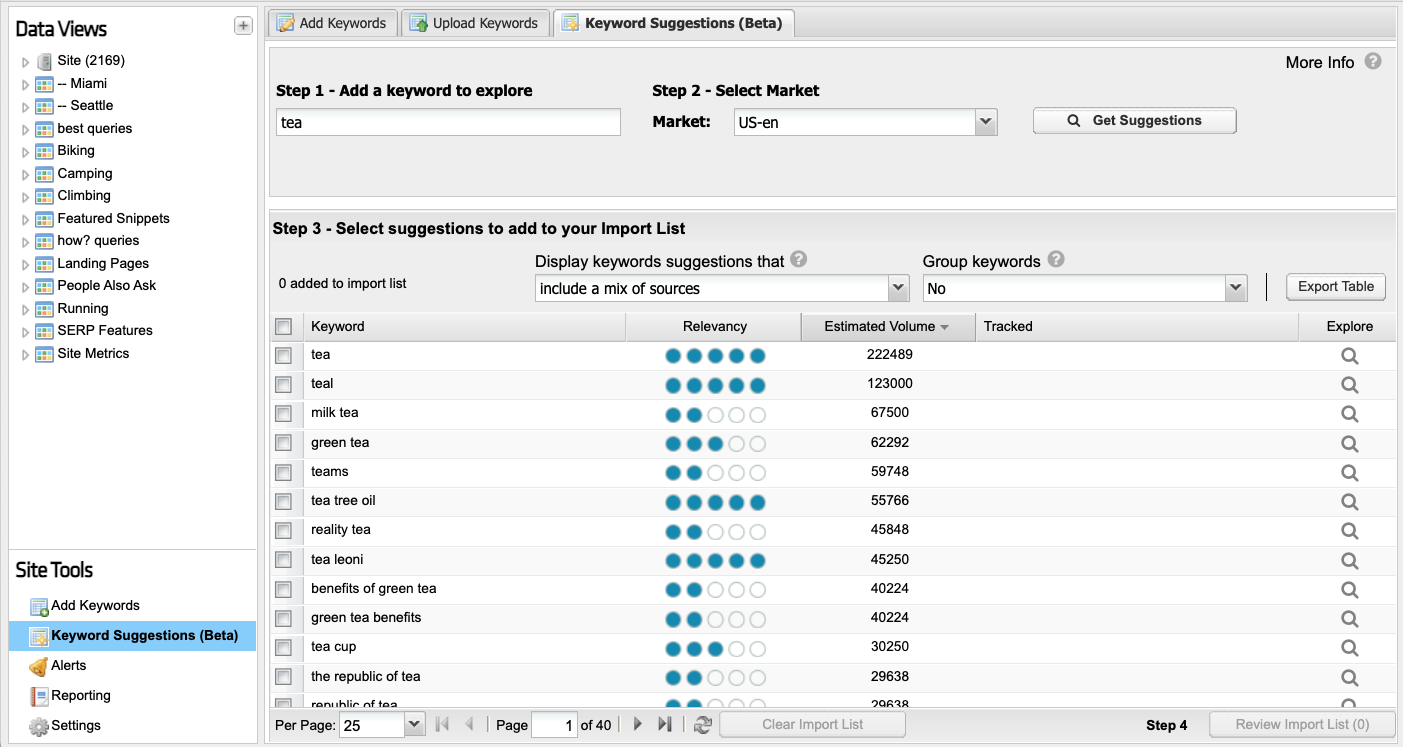Keyword suggestions
Build powerful content& tracking strategies.
Fuel your content and optimization strategies with keywords perfectly tailored to your needs.
With a strong keyword foundation in place, you can introduce new product lines, extend your brand reach, and draw up competitive game plans with more confidence.

Access half a billion quality keywords
See thousands of intuitive suggestions from Moz Keyword Explorer — the industry’s most trusted keyword database. 1.25 billion quality-vetted keywords, millions added each month, now in STAT with no limits.

Identify high-impact keyword opportunities
Sort your keyword suggestions by search volume and relevancy to ensure the content you create speaks directly to the largest possible audience.

Quickly surface targeted topics
Group, filter, and refine your lists in just a few clicks and take your content and tracking strategies from one-off keywords to focused topics.

Easily export your data for deeper research
Bring other metrics into the mix for more analysis. Simply export your suggestions out of STAT for easy integration with your other dashboards and reporting suites.

Move seamlessly from insight to action
Get up and running in STAT faster and start measuring your successes right away. With a streamlined workflow, you can get initial keyword lists and new suggestions tracking instantly for your site.


“You’ve helped us get a handle on how our keywords are doing all over the country.”
Jake Marcet
SEO Analyst, Cars.com
Keyword Suggestions
In-app access to the industry’s most trusted keyword database: Moz Keyword Explorer.
Sort by search volume & relevancy
Identify high-value keyword opportunities.
Group, filter, & refine
Take your content strategies from one-off keywords to focused topics.


“If you don’t have this software, you’re way behind competitors who do.”
Running a global education site requires keyword tracking across multiple countries and cities in real-time, which STAT provides with ease.
Simon Sedorenko
Senior SEO Specialist, New York Film Academy


“I'm a huge fan of STAT’s device rank tracking and how I can track in very specific locales.”
Mike King
Digital Marketing Consultant, ipullrank.com

Common Questions
about keyword suggestions
-
I only track 500 search terms. Why would I ever need 10,000 or a million keywords?
You’d be surprised! Once you start seeing the kinds of insights you can only get from large-scale rank tracking and SERP analytics, those numbers will make perfect sense.
Most of our clients track their keyword lists for multiple markets, search locations, and devices. With such comprehensive SERP tracking, even a modest list of 500 search terms can quickly multiply into many thousands of distinct search queries.
Want a glimpse of how our clients get a competitive advantage from tracking on this scale? Read our client snapshots. Want to chat about your specific situation? Feel free to talk to us.
-
What if I need to track over 100,000 keywords? How does your pricing scale?
STAT is designed especially for enterprise-scale SERP tracking.
If your tracking needs are huge, don’t worry — we can handle it. Our clients include some of the world’s largest online brands, tracking thousands of domains and locations globally.
Our pricing model is different than what you might expect from conventional enterprise software. We want to encourage all of our clients to think bigger and track more widely than ever before, so our per-keyword rates are highly competitive.
In fact, if you plan on tracking more than 100,000 unique search queries, ask us about special pricing and our bulk API services.
(For deeper custom research, some of our larger clients choose to use our separate, specialty bulk API services for full Adwords ads, full parsed SERP archives, or raw HTML SERPs. These are billed extra by site, and are completely separate from our standard API.)
-
Isn’t daily SERP tracking overkill? What about weekly or monthly?
The search landscape is very volatile, so daily tracking is what our clients need to respond quickly and stay on top of the competition.
For some types of reporting, daily data can be too granular. STAT makes it easy to report weekly or monthly averages for key metrics. Because these averages are based on actual daily SERP data rather than once-a-week or once-a-month snapshots, they offer an incredibly accurate representation of what’s happening in the SERPs.
-
How do I manage so much data? What exactly is “smart segmentation”?
When you’re doing SERP tracking on such a large scale, great management and segmentation is critical.
In STAT, you can tag your keywords with as many custom tags as you please. These are essentially custom segments that you can use to slice your keywords in any number of ways — for example, by product characteristic, by subject area, or by searcher intent.
There are also dynamic tags, which work like smart playlists. They are automatically populated with keywords based on simple, logical rules.
For example, you could create a dynamic tag that contains all of your keywords with search volume over a million. As search volume numbers are updated, the keywords within the dynamic tag will update as well.
You can base your reports and custom alerts on any tag or set of tags, which creates endless possibilities for mining new insights from your SERP data.
-
Am I charged for duplicate keywords?
The short answer is yes, but at a much lower per-keyword rate.
The longer explanation is this. In STAT, the term “duplicate keyword” has a specific technical definition. If you were to track the same 100 search queries against 10 different websites, then we would count that as 100 unique keywords and 900 duplicate keywords. Those duplicate keywords each cost much less than a unique keyword.
On the other hand, if you were to track 100 search terms in 10 different markets, that is effectively 1000 distinct queries or unique keywords.
At high-volumes, the math can get complicated. But the basic idea is simple: we charge one rate for each unique keyword, and a much lower rate for each duplicate keyword.
It’s all broken down transparently in your account, so you can see exactly what you’re paying at any time.
-
How can I get all of my data out of STAT?
In the STAT web app, it’s as simple as right-clicking on any table to export as a CSV spreadsheet. You can also create scheduled reports so that all of your key data is exported to spreadsheets regularly.
For higher-volume exporting, we have the API. That also allows you to integrate STAT’s metrics into your own internal data warehousing.





